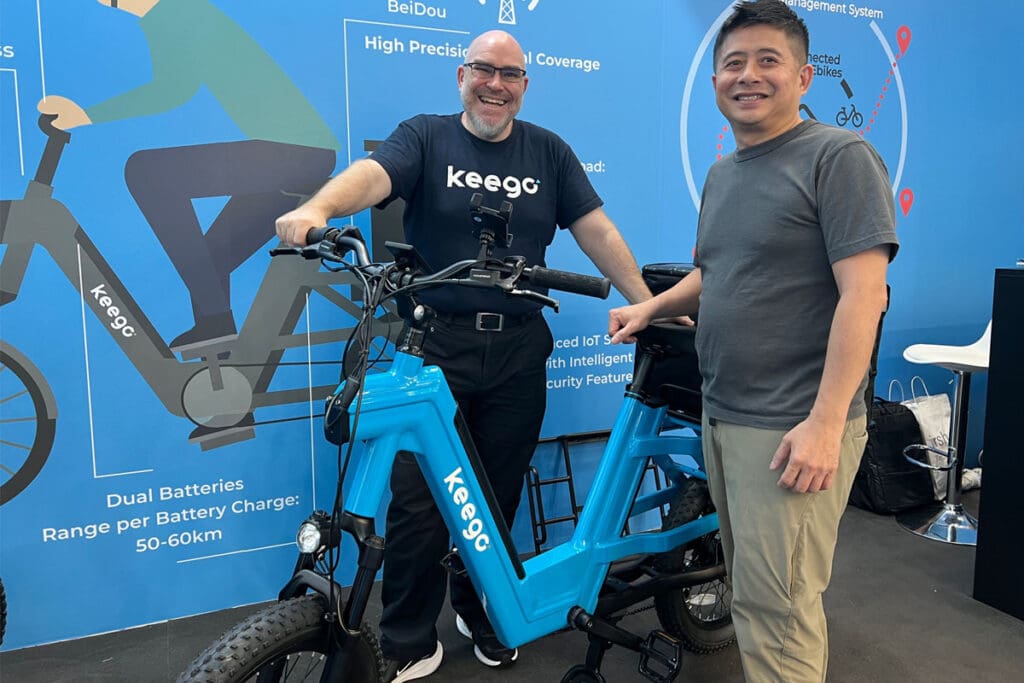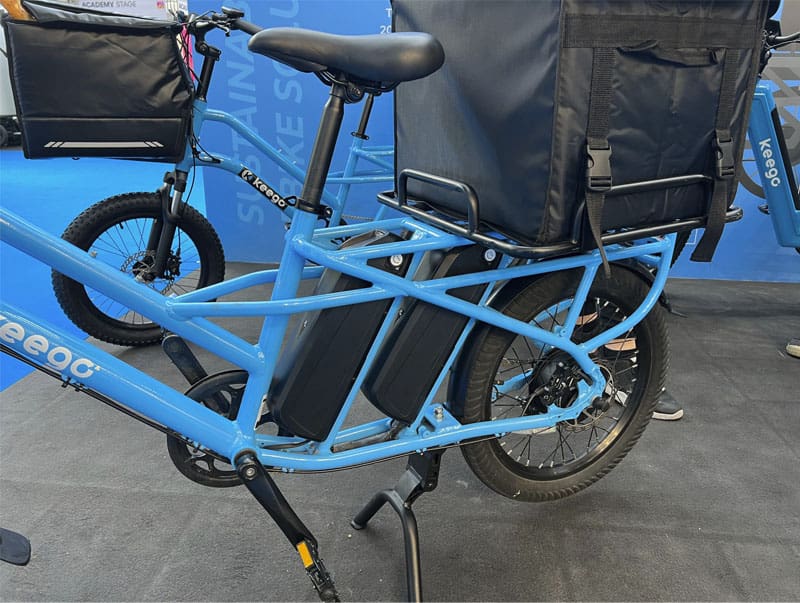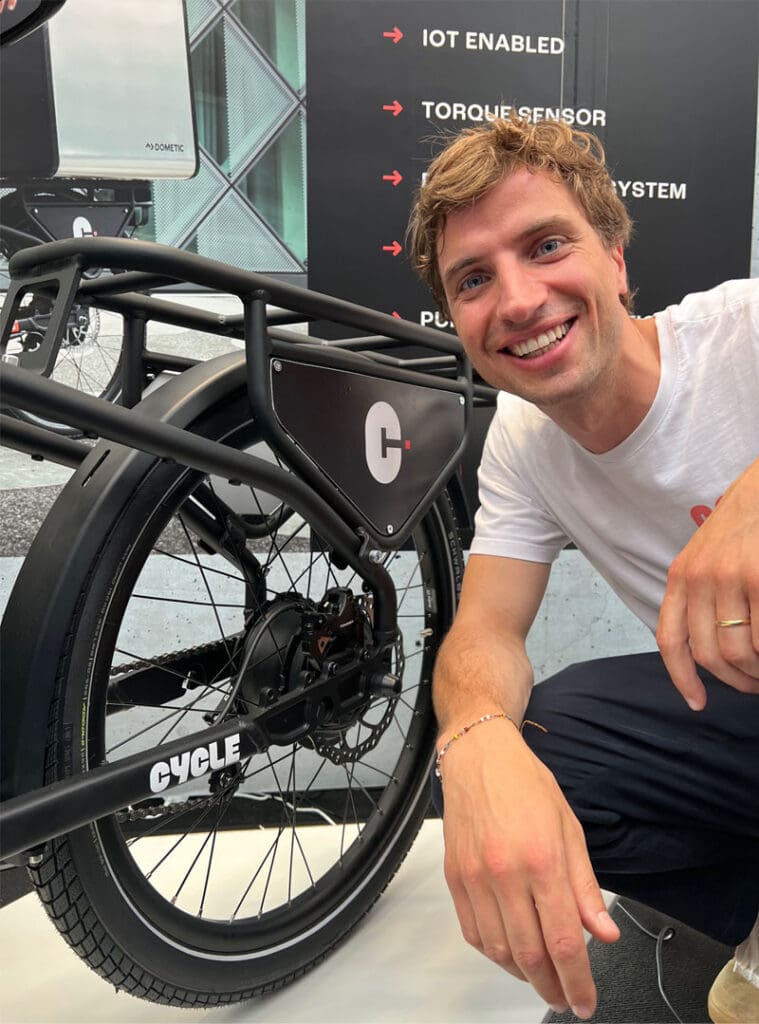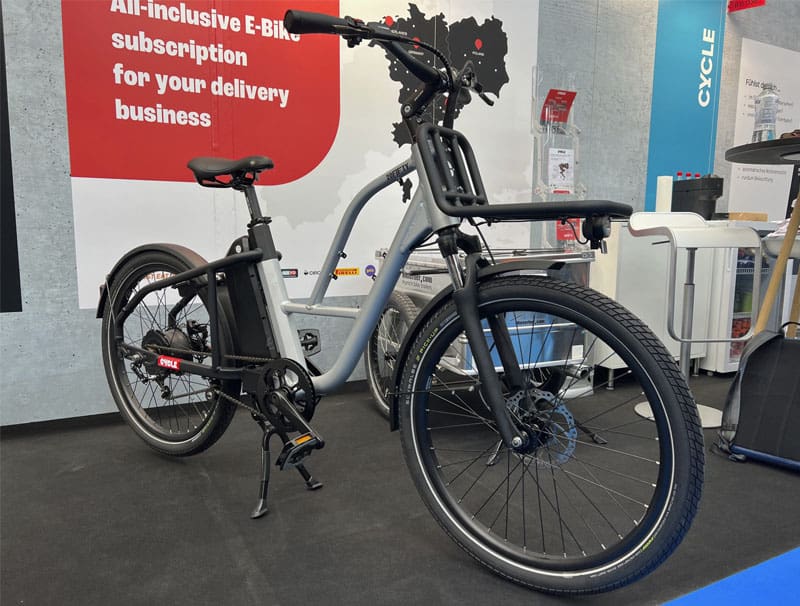Keego Poised For Australian Arrival This Year

Frankfurt, Germany
A Swedish-based company exclusively focused on supplying e-cargo bikes for commercial delivery services expects to expand into Australia by the end of the year.
Keego, a young company which made its debut at Eurobike in 2022, says it is talking to three Australian distributors and is expecting to have its first order for this market before the year is over.
Its founders were back at Eurobike this year and unveiled the prototype of its second model, the KG5, which is likely to go into production in the next seven or eight months, according to co-founder and chief marketing officer Elias Ek.
The more futuristic-looking KG5 will have greater digital integration than the existing KG4 model, including rear turning indicators, a wireless phone charger and an AI front camera, enabling fleet managers to monitor bike usage, including rider behaviour.
The IoT system links the bike’s camera back to Keego’s digital hub, which will assist with issues such as crash involving the bike and help schedule its maintenance.
It will also have greater battery capacity, 150km range compared to 100km for the dual-battery options for both models.
“Delivery riders will have to option to lease it for private use, so there’s also the capacity to fit a chariot child’s seat on the back,” Elias said.
The KG5 is expected to wholesale for US$3,000 (A$4,460).
He said improvements with the KG5 were largely spawned by customer feedback, including an option for 24-inch wheels.

The KG4 has also undergone considerable refinement during the past 12 months. Revised frame geometry has brought a lower rider position and a higher rear rack, to improve access to the batteries.
Elias said there has been a steady evolution of the bikes since Keego sent out its first batch of 300 bikes to potential customers around the world, as part of the company’s rare focus on commercial delivery.
While those companies came back with a number of suggested improvements, and the bikes needed a lot of fixing, they also put in a significant number of orders to buy the bikes.
“Thirty percent of those companies came back and ordered more bikes,” he said.
Elias said while there are “a lot of bikes on the market that look alike” but evolution and details of Keego’s bikes are targeting purely on the needs of delivery riders.
Chains have added rust proofing, there’s extra waterproofing to protect electronics, the tyre valves are steel for greater durability and, while the bikes have the usual 25kmh limit for drive assistance, the software brings quicker acceleration to reach that limit faster.
“Couriers tend to be young guys who want to make as many deliveries as possible. While the maximum speed assist is still 25kmh, getting riders to that speed faster will save them time,” Elias said.
The KG4, which wholesales for approximately US$2,300 (A$2,972), comes primarily as a single-speed – also for greater durability and reduced risk of downtime – but is also available as a seven-speed for particularly hilly locations.
“We are not trying to be something for everyone. There are about 30 million couriers around the world and they are our focus.
“A couple of bike brands are saying they are focused on the delivery market and that’s been our vision since we started talking about it three years ago.
“We did a month-long pilot with Uber Eats in Stockholm, as part of our role-out in Europe, and half of the riders came back and bought the bike.”
Keego is a very global organisation. Registered in Singapore, the company has its headquarters in Stockholm, its CEO, Phil Corri, is in Dublin, Elias is based in Taiwan, where the bikes are manufactured, and the business also has operations in Berlin and Manchester.

20FIFTY Introduces Dual Dropouts
Another e-cargo bike manufacturer with a focus on commercial delivery services, Cycle, has unveiled it solution to allow greater flexibility for operators – a dual drop-out system that allows a bike to be converted between a short tail and long-tail configuration.
The Berlin-based company used Eurobike 2023 to release its 20Fifty electric cargo bike, named after the Paris Climate Agreement and its target for national to reach net zero emissions by 2050.
Company co-founder and CEO, Luis Orsini-Rosenberg, said while the switch between short and longtail would have to be done by a Cycle technician, the ability to change between a 122cm or 130cm wheelbase would bring welcome flexibility.
Founded in 2018, the B2B subscription service has been supplying bikes from other manufacturers, to clients in Germany, the Netherlands, Italy, Austria and Poland.
With customers including Dominos, Getir, Just Eat Takeaway, Wolt, Pirelli and Gorillas, the bikes were being used from 7am to 11pm and Luis said Cycle faced a number of challenges such as long-term battery life from such intensive use.
“In 2021, we signed large contracts with some developing companies, distributing 10,000 e-bikes,” he said.

“We decided most bikes don’t stand up to the demands, so we decided to develop their own and built it from the ground up.
“We didn’t want to develop three bikes to meet the various demands of those companies, so we thought ‘let’s have one bike that fits all use cases’.
“We hadn’t seen any bikes on the market with the dual drop-out system, so we applied for the patent and that is still pending.
“You can either have an extended luggage rack, which offers additional loading space and comes in particularly useful when transporting large loads. Alternatively, you can shorten the wheelbase to achieve greater agility and manoeuvrability, which is advantageous when the e-Bike has to navigate busy and narrow urban areas, and the load volume is less important than the range.”
The 20FIFTY will have a battery range of 1000 watt hours, to up to 150km, and a load capacity of up to 200kg.
Its IoT integrated module allows the bike to be tracked if stolen and the bike can be switched off remotely.
But beyond the module and a torque sensor for the single-speed system, Luis says the 20FIFTY has a minimum of electronics to make the bike as reliable and maintenance free as possible.
Cycle started developing the 20FIFTY in November 2021 and had a prototype ready the following November.
Production of the 20Fifty has begun and an initial batch of 250 bikes is scheduled for release in the last quarter of this year.
Luis says almost all of those 250 units have been pre-sold and another 2,000 units are expected to be available from December.
Cycle’s full-service subscription model for the 20FIFTY will start at €129 (A$213) per month and the company is also considering making the bike available for sale to private customers.
Cycle recently raised €10.3 million (A$17 million) in a Series A funding round led by Scania Growth Capital, with a vision e-bikes can claim 50% of the market for all deliveries in European urban areas.
